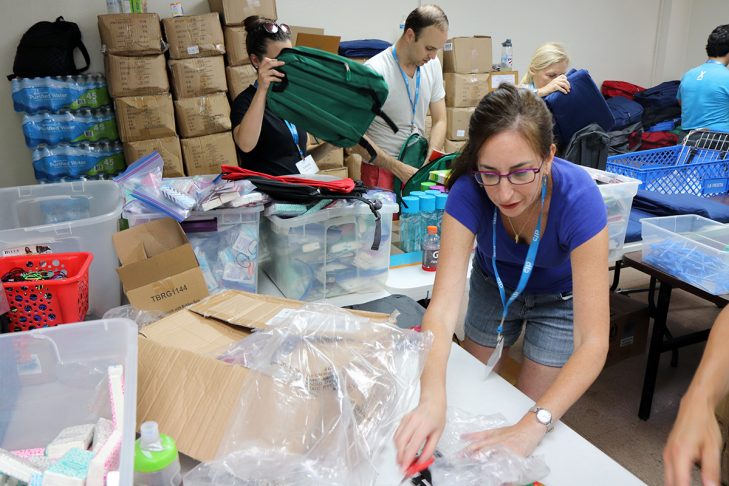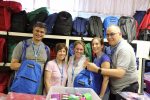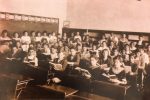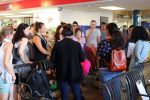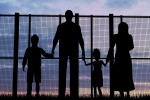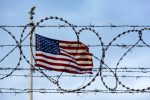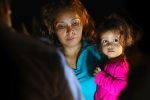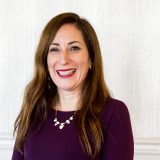A group of CJP supporters and partners went on a volunteer mission to San Antonio, Texas, where we spent two sweltering days volunteering and learning more about how the CJP Fund to Aid Children and End Separation (FACES) will help asylum seekers by providing legal assistance, social workers to act as family reunification specialists to help find the parents of separated children, and trauma specialists to support children experiencing extreme distress. Here are some of my thoughts.
1. It’s not just a backpack
I have a lot of experience with backpacks. My daughter, Isabel, takes one to school. I use a backpack to hold my personal belongings when I travel. At Jewish Big Brothers Big Sisters (JBBBS), we assemble new backpacks full of school supplies for Little Brothers and Sisters to be prepared for the upcoming school year.
So when CJP asked me to join the CJP Fund to Aid Children and End Separation (FACES) mission to San Antonio to assemble backpacks full of basic supplies for asylum seekers to support the work of the Interfaith Welcome Coalition (IWC), I said to myself, “I know backpacks, I got this!”
But nothing would prepare me for delivering the backpacks at a San Antonio bus terminal, where asylum seekers are dropped off after being held in detention centers.
As I walked in, I saw a terrified teen mother crying. I later found out that she had just arrived at the bus terminal and, like countless others, was seeking safety in the United States. This mother was nursing her baby while her young son and daughter stood next to her. Wanting to help this mother in some way, I looked at the backpacks we had just filled with supplies.
I asked an IWC volunteer where the mother’s personal items were and was told that asylum seekers released from detention centers are not allowed to take their belongings with them, if they even had anything at all.
This mother had nothing—no food, water, clothes, diapers, toys or money. The backpacks she and her children were receiving from our group were now her everything. Her children devoured the snacks. The stuffed animals were squeezed tightly.
In that moment, I understood that the backpacks being distributed by the IWC are truly essential.
From this point on, I will never see a backpack as just a backpack.
-
2. The light of human goodness shines brightest in the face of atrocity
After seeing this beautiful family and understanding their story of trauma that included fleeing gang violence in Guatemala, I walked out of the bus terminal, turned the corner and sobbed uncontrollably. I cried for the women who are born into a culture of violence, for the parents who are robbed and extorted and therefore are left with no money to buy food for their children. I cried for the trauma so many fled from, only to continue to experience more trauma on their way to America and then again when they are here. I cried knowing that this family was among the lucky ones who made it to the bus station but face more days of travel to their destination. I cried for the parents whose only desire is safety for their child.
But when I stopped crying, I looked around and was gratified by what I saw: Sister Denise, a nun who works with the IWC, making calls to get the mother on another bus quickly so that she wouldn’t have to suffer another unsafe night alone; a mission volunteer emptying her wallet so that the mother could buy food for her children; another volunteer talking to this mother in her native language, trying to ease her nerves; another volunteer offering her a hotel room; and the children drinking from the water bottles we packed and finding some solace in hugging their new stuffed animals.
I met so many compassionate people on this mission: the lawyers from the Young Center fighting for the rights of unaccompanied minors, the volunteers at the El Salvador United Methodist Church who pack and distribute 200 backpacks per week, an Uber driver who buys an extra bag of groceries for the homeless, Sister Denise who meets asylum seekers day and night at the bus station and brings them home with her if they have no place to spend the night.
I saw the goodness that shines brightest in the face of atrocity.
3. It doesn’t take a lot of money to make a big difference
I know many people wonder whether a small donation can make a difference. I’m here to tell you it does. Due to the successful sourcing from the IWC, each backpack is only $12. I will be the first to tell you these backpacks make a difference.
4. Our actions are guided by values
I learned so much about what is going on in the world around us and about myself and my fellow volunteers. I am reminded of the impact all of us can have on improving someone’s life and making a difference in the world. As soon as I returned to Boston, I told my daughter about what I did and the people I met. She understood the importance and we made a plan to return.
5. CJP and the Greater Boston Jewish community take care of the vulnerable
It’s an honor to be part of a caring community. I am proud to have represented JBBBS on this CJP-led mission. When we stand together for justice and compassion for all, we make a bigger impact than any one of us can alone.
To learn more about FACES, please visit CJP Fund to Aid Children and End Separation. You can make a donation in any amount to the campaign here.
Never miss the best stories and events! Get JewishBoston This Week.
This post has been contributed by a third party. The opinions, facts and any media content are presented solely by the author, and JewishBoston assumes no responsibility for them. Want to add your voice to the conversation? Publish your own post here.
MORE


